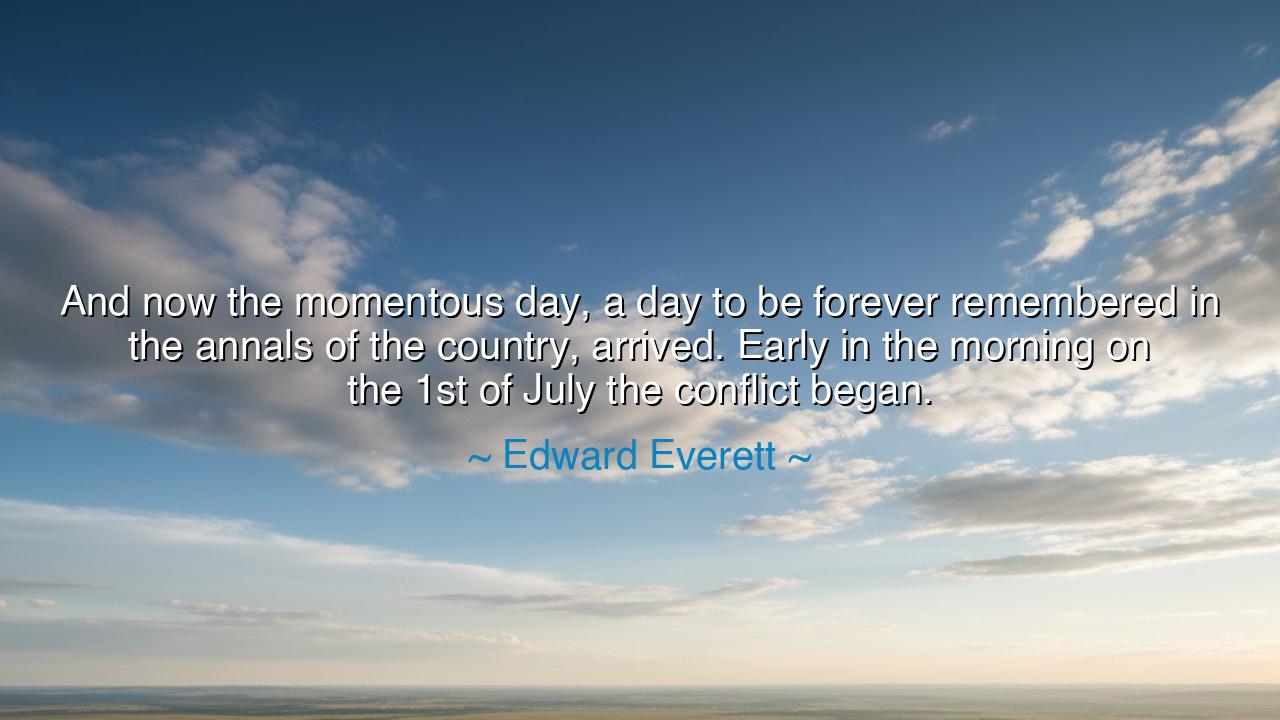
And now the momentous day, a day to be forever remembered in the
And now the momentous day, a day to be forever remembered in the annals of the country, arrived. Early in the morning on the 1st of July the conflict began.






The words of Edward Everett resound like the tolling of a great bell: “And now the momentous day, a day to be forever remembered in the annals of the country, arrived. Early in the morning on the 1st of July the conflict began.” In these lines, he was not speaking of an ordinary day, but of the dawn of Gettysburg, the great turning point of the American Civil War. His words are imbued with the solemn weight of destiny, for they capture the instant when history itself sharpened, when a nation’s fate was placed upon the anvil of war.
The meaning of this statement is that certain days rise above all others, carved into memory not by choice but by consequence. They are the days when the ordinary rhythm of life is shattered, and the march of events quickens into thunder. Everett, an orator of immense power, understood that the 1st of July was not simply the opening of another battle, but the beginning of a struggle whose outcome would echo through generations. To call it a “momentous day” was to acknowledge that there are moments in history when time itself seems to pause and take note.
The origin of these words lies in Everett’s oration at Gettysburg, delivered on November 19, 1863, the same day as Abraham Lincoln’s immortal Gettysburg Address. Everett, chosen for his reputation as the greatest speaker of his age, gave a two-hour address to consecrate the field. In his recounting of the battle, he sought to honor the soldiers and fix in the nation’s memory the sacred weight of their sacrifice. It was in this context that he spoke of the 1st of July — the morning when Union and Confederate forces clashed in the fields of Pennsylvania, and the destiny of the republic hung by a thread.
To understand the force of Everett’s words, one must recall the scale of the conflict. Gettysburg was not only the largest battle ever fought on American soil, but a moment when the very idea of the Union seemed imperiled. For three days, tens of thousands bled and died. Fields once green were stained red, and the peaceful town became a crucible of fire. When Everett called it “a day to be forever remembered,” he spoke not only of tactics and armies, but of the eternal sacrifice of ordinary men who rose into immortality by laying down their lives.
History shows that other nations too have their momentous days — days when the spirit of a people is tested. The Greeks had Marathon, where free men turned back the might of Persia. The English had Agincourt, where the outnumbered stood fast. The Americans had Gettysburg, where the question of liberty and union was decided in smoke and steel. Such days are not chosen, but thrust upon a people, and in facing them, a nation’s character is revealed.
The lesson is this: we must be awake to the weight of history when it presses upon us. Not every day is momentous, but when such days arrive, they demand courage, sacrifice, and vision. The men who rose on July 1st did not know they would shape the future of their country, yet their actions did so nonetheless. Likewise, in our own lives, there are days that define us — days when we must decide, when our choices ripple outward to affect countless others. To recognize these moments is to live not blindly, but with the awareness that destiny often hides in the ordinary dawn.
So, children of the future, carry Everett’s words with you: there will come a morning when the conflict begins, whether in war, in struggle, or in the trials of the soul. On that day, do not shrink back. Stand firm, as those before you stood at Gettysburg. For it is in these momentous days, the ones written forever in the annals of life, that the measure of men and nations is taken. And if you meet them with courage, the echo of your deeds will endure beyond your own time, carried forward as part of the eternal story of humanity.






AAdministratorAdministrator
Welcome, honored guests. Please leave a comment, we will respond soon